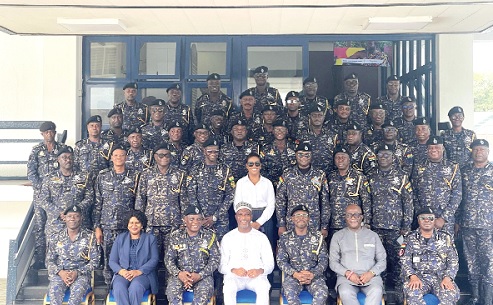The Minister for the Interior, Mohammed Mubarak Muntaka, has announced that foreigners found engaging in illegal mining in the country will be repatriated without compromise.
He has, therefore, urged all regional police commanders to immediately hand over any foreign national found within their jurisdiction engaging in illegal mining or any other fraudulent activity to the Ghana Immigration Service.
Already, he said, 170 foreigners had been repatriated since he assumed office as the Interior Minister.
“I have formally written to the Inspector General of Police (IGP) that if any commander fails to follow this new directive, it may indicate that they do not wish to remain in that region, and we may have to reassign him or her to areas where there are no galamsey activities.
This is a firm decision, and we will not compromise on it,” Mr Muntaka stated.
He was speaking at a regional police commanders’ conference held in Accra last Friday.
The event brought together regional police commanders from across the country to deliberate on new measures to improve security, law enforcement and professionalism within the police service.
Mr Muntaka further announced that the chassis numbers of bulldozers and other machinery found at illegal mining sites would be traced to their owners, and they would be made to answer for their involvement.
“If you are renting your bulldozer or other equipment to illegal miners, thinking you can sit at home while they operate, you are mistaken.
Once we find the equipment, we will trace the ownership and come to you at home,” he warned.
Gun licensing policy
The minister disclosed plans to introduce mandatory firearm training for individuals seeking gun licences.
He stated that background checks suggested that many gun owners lacked proper training in handling and storing of firearms.
“We are going to introduce a policy where before you receive a gun, you must undergo training supervised by the police and be certified to handle and store it safely.
This will help to prevent accidental shootings and misuse,” he explained.
Police professionalism
Mr Muntaka further emphasised the need for continuous professional development for police officers.
He criticised the current promotion system, where officers advanced based on years of service rather than structured skills training.
He proposed a policy where officers would undergo training at each rank before moving to the next level.
“For instance, from DSP (Deputy Superintendent of Police) to Superintendent, there should be mandatory skills training.
Similarly, from DCOP (Deputy Commissioner of Police) to COP (Commissioner of Police), there should be leadership and strategic training,” he stated.
He expressed confidence that this initiative would enhance the professionalism of the police service and align it with global standards.
Illegal mining
The IGP, Christian Tetteh Yohuno, observed that illegal mining posed a significant security risk, particularly in the country’s forest reserves and mining communities.
In regions like the Western North, he said, armed criminals had carried out brutal attacks on innocent people, including forest guards.
“This lawlessness must not be allowed to continue.
We are declaring war on crimes related to illegal mining, and I expect every Regional Commander to take decisive action to bring perpetrators to justice,” he said.
Bawku conflict
Another pressing issue he mentioned was the prolonged conflict in Bawku, which Mr Yohuno said had profound national security implications.
“As law enforcement officers, we must restore lasting peace in the area. Many of you have extensive experience in conflict resolution and international peacekeeping.
We must apply this expertise to unite feuding factions and end this long-standing dispute. It is unacceptable for this issue to persist for years without a concrete resolution,” the IGP said.
He stated that his administration seriously considered public perception issues such as corruption, police intimidation, excessive use of force and procedural injustices with disdain, saying they undermined the service.
“These issues directly affect the service's credibility and cannot be tolerated. I, therefore, urge all regional commanders to take deliberate steps to address them and uphold the reputation of our institution,” Mr Yohuno said.
Officers’ welfare
The IGP urged the regional commanders to prioritise the well-being of the men and women under their command in order to provide effective service delivery.
He said medical care, accommodation and overall working conditions must not be overlooked.
Mr Yohuno gave the assurance that once the Police Council was constituted, all pending petitions regarding police promotions and welfare matters would be referred for consideration.

